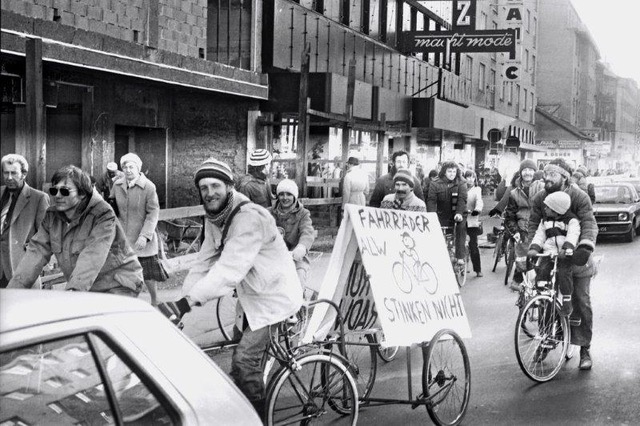PLANETARY CARING
Spatial practices and environmental justice from feminist, migrant and decolonial perspectives

Photo: "Radsternfahrt 1983", private
Planetary Caring. Spatial practices and environmental justice from feminist, migrant and decolonial perspectives.
The demand for environmental justice emerged from multiple social movements – such as the civil rights movement in the US or indigenous activist groups and feminist collectives in Latin America. They organize against the destruction of their environment and protest that social groups, who are already being discriminated against, are especially hit by ecological destruction. For example, inhabitants of neighborhoods (as well as cities and regions) with lower financial resources are often exposed to severe contaminations of air, water, and land. On a global level, in formerly colonized zones of the world, the environment – and as such the livelihood of its inhabitants – is unequally and unjustly being destroyed. For generations, inhabitants of formerly colonized zones have had to live with the constant exploitation and destruction of their environment. At the same time, the destruction of livelihoods leads to increased migration on the entire planet.
In defiance of these circumstances, activist groups, as well as theorists and artists, who maintain and take care of their environment, develop models of protest and co-habitation aiming to resist the extractivist logic of capitalism. They emphasize the entanglements of human and non-human life, exploring how we can live together on a damaged planet (Haraway), to build a more liveable future.
In the seminar, we will work with texts, artworks, as well as examples from activism to better understand the complex relations between planetary caring and environmental (in)justice in the context of gender, migration, and decolonial movements. We will discuss spatial practices by exploring these different aspects in relation to each other. For that purpose, we will dive into the works of artists, curators, urban theorists, geographers, and especially activists as well as into local examples of ecological destruction and forms of resistance against it.
Examples for art works and texts we will discuss together in the seminar:
Mierle Laderman Ukeles, Touch Sanitation Performance, 1979-80
Harun Farocki, The Silver and the Cross, 2010
Amanda Strong und Leanne Betasamosake Simpson, Biidaaban (The Dawn Comes), 2018
Smirna Kulenović, Our Family Garden II: Prva Ženska Linija, 2021
Macarena Gomez-Barris, The Extractive Zone, 2017
Donna Haraway, Staying with the Trouble, 2016
Elke Krasny, Maßstäbe der Sorge. Feministische Raumpraxen, 2022
Karin Reisinger, Struggles at the ‘Peripheries’: Situated knowledge production and feminist visions for post-extractive environments, 2022
Donna Haraway. 2016. Staying with the Trouble. Making Kin in the Chthulucene. Durham and London: Duke University Press.
The seminar is based on affirmative pedagogy (following to Rosi Braidotti). The main elements are text, book and lecture discussions, excursions, discursive development of individual interrogation, which also involves methods of drawing. Workshops will allow us to practice the handling of scientific sources, good scientific practice and writing abstracts. Individual meetings are possible if necessary.